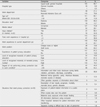Abstract
Purpose
With the rapid increase in information technology in the medical environment, protection of patient's privacy is a crucial issue to hospital nurses. The purpose of this study was to determine neonatal nurses' perception and performance of behavior to protect patient privacy, and professional self-concept, and to investigate the relationships among these variables.
Methods
The participants in this descriptive correlation study were 182 nurses in nursery and neonatal intensive care units using EMR or OCS in November, 2011.
Results
Perception and performance averaged 4.61 and 4.04 (out of 5) respectively, and the average score for professional self-concept was 2.73 (out of 4). There was a significant difference between perception and performance. The performance of behaviour to protect patient privacy had a positive correlation with perception and professional self-concept. Multiple regression analysis showed that the key determinants of performance were recognition of necessity of patient privacy education, professional self-concept and perception, and these explained 36% of the total variance of performance.
Figures and Tables
References
1. Arthur D. Measuring the professional self-concept of nurses: A critical review. J Adv Nurs. 1992. 17:712–719.
2. Bäck E, Wikblad K. Privacy in hospital. J Adv Nurs. 1998. 27:940–945. http://dx.doi.org/10.1046/j.1365-2648.1998.t01-1-00576.x.
3. Baillie L, Ford P, Gallagher A, Wainwright P. Dignified care for children and young people: Nurses' perspectives. Paediatric Nursing. 2009. 21(2):24–28.
4. Bupper C. Complying with patient privacy requirements. Nurse Pract. 2002. 27(5):12–32.
5. Cohen J. Statistical power analysis for the behavioral sciences. 1988. 2nd ed. Hillsdale, NJ: Lawrence Earlbaum Associates.
6. Diekema DS. Ethical issues in research involving infants. Semin Perinatol. 2009. 33:364–371. http://dx.doi.org/10.1053/j.semperi.2009.07.003.
7. Han WJ. The confidentiality of patient information in health services organizations in the United States. J Korean Soc Qual Assur Health Care. 2009. 15(2):25–30.
8. Harris DD, Shepley MM, White RD, Kolberg KS, Harrel JW. The impact of single family room design on patients and caregivers: Executive summary. J Perinatol. 2006. 26:S38–S48. http://dx.doi.org/10.1038/sj.jp.7211583.
9. Hwang SU. Eine kritische Betrachtung ueber die Gewaltaetigkeit der Kultur des Menschengenoms und deren bioethische Rechtfertigung. Cathol Philos. 2005. 7:232–259.
10. Jung SY, Ju HO. Perception and performance of emergency-room nurse's protection behavior for the consumer health information. J Korean Acad Nurs Adm. 2009. 15:403–414.
11. Kim HE, Kim HK. A survey on the attitude of social groups toward security, privacy, and confidentiality of health information: An original paper authors and affiliations. J Korean Soc Med Inform. 1999. 5(3):63–76.
12. Kim HJ, Lee BW, Hwang JH, Lee MS, Na BJ, Lee JY. The level of emotional labor among workers in one university hospital. Korean J Health Policy Adm. 2012. 22:129–144. http://dx.doi.org/10.4332/KJHPA.2012.22.1.129.
13. Kim KJ, Hong SP. Privacy Information protection model in e-health care environment. J Korean Soc Internet Inf. 2009. 10(2):29–40.
14. Kim MO. Perception, and performance of fertility center nurses' protecting behavior for the patient privacy. J Korean Data Anal Soc. 2012. 14:1493–1505.
15. Kim WK, Chung KH. The relationship between professional self-concept, organizational commitment and job satisfaction in clinical nurses. J Korean Acad Nurs Adm. 2008. 14:287–296.
16. Kim YS, Yoo MS, Park JW, Son YJ. Relationship between nurse's self concept and ethical concept. J Korean Acad Nurs Adm. 2001. 7:4415–4423.
17. Kim YJ, Song HK, Lee MA. Perceived relationship among professional self-concept, head nurse's leadership, and nursing clinical competency by clinical nurses. J Korean Acad Nurs Adm. 2011. 17:96–105.
18. Kurtz G. EMR confidentiality and information security. J Healthc Inf Manag. 2003. 17(3):41–48.
19. Lee MY, Park YI. A study on the nurse's perception and performance of protecting patient privacy. Clin Nurs Res. 2005. 11:7–20.
20. Johnson M. Notes on the tension between privacy and surveillance in nursing. Online J Issues Nurs. 2005. 10(2):4.
21. Memarian R, Salsali M, Vanaki Z, Ahmadi F, Hajizadeh E. Professional ethics as an important factors in clinical competency in nursing. Nursing Ethics. 2007. 14:203–214. http://dx.doi.org/10.1177/0969733007073715.
22. Park SY. The effect of value clarification training (VCT) on nurses' professional self-concept, job motivation and job satisfaction. J Kyungpook Nurs Sci. 2004. 8(1):31–42.
23. Seoul National University Hospital. Personal health information protection training. 2010. Seoul: Seoul National University Biomedical Informatics.
24. Shin SJ, Ji HJ, Kwack KD. A study on the patient privacy protection of medical information. Korea Information Processing Society 37th Spring Conference Proceedings. 2008. 15(1):1171–1174.
25. Sohng KY, Noh CH. An analytical study of the professional self-concept of hospital nurses in Korea. J Nurs Acad Soc. 1996. 26:94–106.
26. Sung MH, Oh MO. The relationships of professional self-concept, role conflict and job satisfaction on emergency department nurses. J Korean Acad Fundam Nurs. 2011. 18:107–115.
27. Wallis M, Harper M. Supporting breast feeding mothers in hospital: Part 1. Paediatr Nurs. 2007. 19(7):48–52.
28. Weisbrot D. The Australian joint inquiry into the protection of human genetic information. New Genet Soc. 2003. 22(1):89–113.
29. Yeo K, Kim JM, Lee HJ, Yoon J, Choi I, Yu D, et al. A study and proposal of laws related with security of medical information. 2006. Retrieved September 1, 2012. from http://snubi.org/~submit_kosmi/submit_paper/upload_2006_fall/kosmi_p046_2006_KOSMI_Security_snubh.hwp.




 PDF
PDF ePub
ePub Citation
Citation Print
Print





 XML Download
XML Download